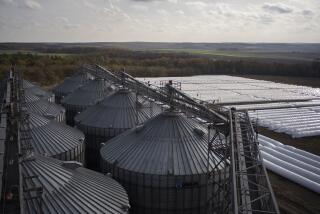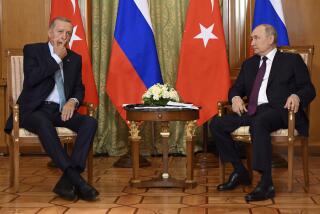Russia Expecting a Record Harvest : Crops: After a disastrous 1992, Moscow now expects to be able to trim grain imports.
- Share via
MOSCOW — Despite shortages of fertilizer, farm equipment and forced labor, Russia is expecting a record harvest this fall.
After years of humiliating dependence on Western wheat, and a 1992 harvest so poor that Russians feared they would go hungry last winter, Moscow now says it can cut back on some imports and hopes to stop importing bread grains entirely by 1994.
Poor harvests have been the downfall of many a Russian leader, and a bumper crop is a political victory. President Boris N. Yeltsin paid his annual obeisance to agriculture Wednesday by standing thigh-high in a wheat field in the key farming region of Orel. The president dutifully “showed great interest” in the latest projects at the Institute of Grain and Bean Cultures in Orel, the Russian news agency Itar-Tass reported.
Abundant rain has helped the wheat grow thick, and if still more rain does not drench the southern breadbasket of Kuban, the grain harvest is forecast at 120 million to 125 million tons.
But will democratic Russia be able to reform Soviet Russia’s tradition of allowing up to a third of its crops to rot before they reach consumers? Not this year, say experts and even some government officials, who admit that agricultural reforms are lagging.
“We can only hope for God Almighty,” Vladimir F. Bashmachnikov, chairman of the Russian Association of Private Peasant and Cooperative Farms, said in a distinctly post-Communist formulation. “He is the only one who can help the peasants.”
Certainly, the free market is unlikely to save Russian farmers anytime soon. Although some of the more onerous features of the Soviet state-controlled agricultural sector have been dismantled, little progress has been made in privatizing farmland or improving the archaic food transportation and storage systems.
Russia has 260,000 private farms, all created since 1990. But they are expected to contribute only 5% to production this year, Agriculture Minister Viktor N. Khlystun said.
Reformers say the agricultural bureaucracy has procrastinated in selling off prime farmland, and many of the start-up farms are outside the fertile “black earth” area on inferior soil.
Most grain is still produced by collective farms, although two-thirds of them have now been transformed--at least on paper--into joint-stock companies and other capitalistic ventures.
Collective farms once relied on harvest help from students, soldiers and urban factory workers ordered out to the fields. But democracy means people can no longer be dragooned into forced farm labor.
Come October, some students and soldiers will be on their knees digging late cabbages out of the mud. But, unlike in the past, this agricultural service will not be obligatory, and all volunteers will work under contract, Khlystun announced last month.
Some think that only the mandatory labor for harvesting kept Russians from winter starvation. Even with the extra help, Soviet agricultural losses usually averaged about 20% and up to 35% in a bad year, said Mikhail I. Silvanovich, editor of the Selskaya Zhizn (Rural Life) newspaper.
“I don’t really think that democratic Russia will do much better than its Soviet predecessor,” said Silvanovich. “Of course, no one doubts that sovereignty and democracy are great things, but this means weakening of control and discipline. At the same time, people still want to eat, and don’t want to hear excuses for the fact that there will be less bread.”
The annals of Soviet agriculture are full of horror stories of neglect. Leaky trucks dribbled grain onto the road and arrived at silos half-empty. Vegetables liquefied in forgotten boxcars. Dairy cows died during holidays because no one came to milk them.
The state cannot command such attitudes to change, Khlystun said.
But farm workers in Nizhny Novgorod were recently given formal legal title to their share of the collective farm’s property--then a dividend from their first six months’ production, Khlystun said. Only five of the 800 workers asked for their dividend in cash. The rest wanted to reinvest.
More to Read
Sign up for Essential California
The most important California stories and recommendations in your inbox every morning.
You may occasionally receive promotional content from the Los Angeles Times.













